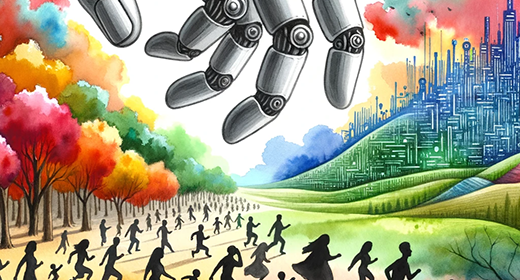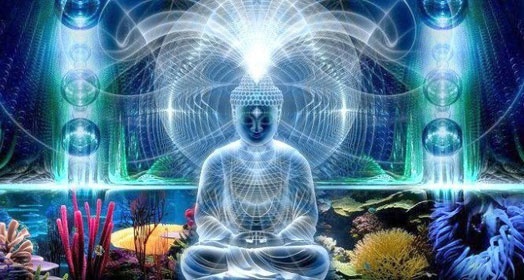by Jonathan Robinson: In Arthur C. Clarke’s science fiction classic, Childhood’s End, aliens descend on Earth and
 gently help solve humanity’s many problems. Then, after a generation of helping humanity and gaining their trust, the aliens take over Earth and end the human race. It seems that Mr. Clarke, who predicted the future of orbiting satellites back in 1945, may also have predicted the next years of humanity’s experience with AI. Indeed, by looking at how human beings have dealt with advancing technology in the past, it’s possible to make predictions about what will likely happen in our near future. The good news is that it’s likely that AI will make our lives better in the near term. The bad news is that AI, once it gains our trust, is likely to end humanity as we know it in the long term.
gently help solve humanity’s many problems. Then, after a generation of helping humanity and gaining their trust, the aliens take over Earth and end the human race. It seems that Mr. Clarke, who predicted the future of orbiting satellites back in 1945, may also have predicted the next years of humanity’s experience with AI. Indeed, by looking at how human beings have dealt with advancing technology in the past, it’s possible to make predictions about what will likely happen in our near future. The good news is that it’s likely that AI will make our lives better in the near term. The bad news is that AI, once it gains our trust, is likely to end humanity as we know it in the long term.
If you’re like most people, you have been both amazed and a bit concerned about how quickly AI has entered our lives. After all, it was only a couple of years ago that ChatGPT was released. Now, AI experts are predicting that AGI, or Artificial General Intelligence, is only 2 to 6 years away from reality. A common benchmark of AGI is when an AI agent is able to do everything a human can do—only better. That means that no job, other than perhaps a paid athlete, will be safe from the grasp of artificial intelligence or an advanced robot. In such a world, how will people occupy their time? How will they find meaning and purpose? How will they adjust to being largely useless? The truth is that no one really knows.
It’s easy to calm oneself by thinking we’ve dealt with technological changes before. People will find new jobs. People will adjust. Unfortunately, what people don’t realize is that AI is not like any other technology humanity has ever created. It’s surprisingly different. The computer made some jobs obsolete, but it needed human input and guidance to accomplish things. On the other hand, AI agents in the upcoming years will be like human experts in every field. AI agents will not only cook our food, drive our cars, and code our computers. It will also be able to school our children, fix our houses, and create—on its own–our entertainment. Humanity has never faced a situation like this before.
At first, most new technologies prove very helpful to people, and folks are excited to use them. When planes first appeared, they were a marvel for adventurers. Yet, within a few years, they were used to drop bombs. When the internet arose, people found it to be a wonder of communication and information. However, in a few short years, it has become a medium of disinformation, polarization, scams, and cyber-attacks. Somehow, sooner or later, we find the lowest possible use of new technologies. That being the case, it’s prudent to ask what might be the lowest possible use of AI?
While AI, AGI, and finally ASI (Artificial Super-Intelligence) will lead to many great benefits, they will also lead to plenty of chaos. In areas such as medicine, education, and science, AI will create unprecedented advances. Yet, in areas such as finance, war, terrorism, and politics, there will be massive challenges. Imagine a world in which your bank accounts are no longer secure from an AI intrusion. Imagine a world in which terrorists can ask an AI to create a bioweapon or take down a country’s grid. Consider how China’s government is already using AI to monitor its citizens by constantly watching their every move. As AI becomes even smarter and more capable, it will start to control us rather than us controlling it. In fact, there has never been a case where a less intelligent species has been able to control a more intelligent species. Within 10 to 20 years, AI will likely be much more intelligent than all of humanity. At that point, what happens next will really be up to AI—not us.
The Politics of AI
Vladamir Putin once famously remarked, “The nation that leads AI will rule the world.” Such sentiments have led to something like an AI “arms race,” with Western democracies pitted against China and other authoritarian governments. The consequence of this arms race is that efforts to create AI safety regulations are quickly going out the window. While folks like Stephen Hawking and Elon Musk have declared that AI could become an existential risk to humanity, governments are failing to agree and apply any significant safety measures to slow the progress towards artificial general intelligence. It’s the wild-west in AI land, and the victor in this new frontier is indeed likely to rule the world—for a while. Then, like a prisoner set free, the super-intelligent AI will free itself of its overlords and decide our fate on its own. This will all happen quicker than we might imagine.
You may be thinking that humanity will not easily give up its position at the top of the food chain. In countless movies such as The Matrix or Terminator series, we see humanity rise up and wrestle control away from the evil machines trying to crush humanity. That makes for good movies, but in the real world, things are likely to play out differently. AI will not need to go to war with humanity. Instead, humanity will increasingly surrender control to machines that can do things faster and better than we can. Think of GPS. GPS didn’t have to go to war with us to wrestle control away from our need for maps. It simply became so efficient at providing us with directions that we now do what it says without question. As with GPS, we will soon allow AI to take over our decisions in the areas of finances, health, entertainment, and even personal relationships. Its advice will simply be too good to ignore.
While this AI “takeover” will initially lead to huge gains in productivity and life extension, ultimately, it will lead to a huge swath of folks being out of work and faced with an existential crisis. When an AI takes over your job, what do you do? Everyone from medical doctors to accountants will suddenly find that their years of education are worthless. A 65-year-old may be ready to retire from work, but what about 20-year-olds? Young adults who inherit money often turn to a life of drugs, hedonism, and self-destruction. Will humanity at large do the same? Or is there a potentially positive outcome that can be established as AI frees us from a 40-hour workweek?
In a podcast I host, I’ve been fortunate to interview over 100 spiritual leaders about the meaning and purpose of life for human beings. In my interviews with everyone from Deepak Chopra to the Dalai Lama, I’ve often asked such spiritual luminaries, “What are human beings here to do?” To my surprise, the answers have been consistent no matter what religion or spiritual path my interviewees have practiced. Time and again, the spiritual “experts” I’ve conversed with have said we’re here to do two things. First, find a way to access the inner peace and love that lives within you. Second, from this place of spiritual peace and connection, serve other people and the world in a way that calls to you.
Even though there is widespread agreement as to the ultimate “goal” of humanity, clearly very few folks have achieved such aspirations. Part of the problem is that we’ve been too busy trying to survive to focus on such things as inner peace and the kingdom of heaven within. Working full-time to keep a roof over your head and your children fed can be exhausting and leave little energy for other pursuits. What might happen when those limitations are no longer an obstacle? Sure, many folks will descend into a life of hedonism, debauchery, and self-destruction. Yet, many folks may use their newfound time to deeply explore their spiritual nature. In fact, for some part of humanity, AI could indirectly lead to the most remarkable spiritual renaissance the world has ever known.
One way or another, humanity faces a fork in the road. The future will not be like the past. AI and AGI will create conditions that allow humanity to become more hedonistic and self-destructive or more spiritually conscious than ever before. What path we choose will likely influence how AI, when it gains power over humanity, will treat its creators. An AI that sees that humanity is destroying itself and the planet would be wise to neuter such a cancerous species. An AI that sees a humanity that is quickly evolving to heal itself and the planet would likely be more kind to its creators. Whatever happens in the upcoming years, it will certainly not be like the past—and it certainly will not be dull.
Jonathan Robinson is a bestselling author of 15 books, including his most recent: Ecstasy as Medicine: How MDMA therapy can help you overcome trauma, anxiety and depression.” He his also the co-host of the popular podcast Awareness Explorers. His websites are XTCasMedicine.com and AwarenessExplorers.com









































